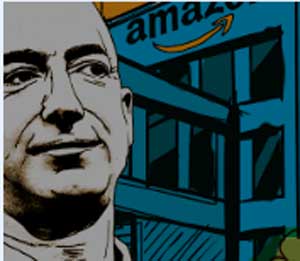Something a bit different this week, but I am confident most of you will enjoy it.
It involves the rather amazing tale of Amazon’s use of a shell company to gather intelligence from its chief rivals, including Walmart, Shopify and Target.
The results of a multi-month investigation by Dana Mattioli of the Wall Street Journal were released as a podcast this week, in which Mattioli is interviewed by colleague Ryan Knutson. So here we go.
Gilmore Says.... |
 |
| That, Mattioli says, gave Amazon through Big River “information on the shipping process there [Walmart] and those rates and how that works.” |
 |
What do you say? |
|
| Click here to send us your comments |
| |
|
|
|
According to Mattioli, Amazon created a shell company called Big River Systems International, whose purpose was to get competitive intelligence on the processes, user experience, logistics offerings and more of top Amazon rivals.
This is all hard to believe, to be frank, both in the scope of the skullduggery and that it could go on for so long without being exposed.
The focus of the info gathering were related to the third-party Marketplace arena, in which product vendors of myriad types sell through the ecommerce platforms of Amazon, Walmart and other retailers. In this mode, the retailers provide the selling capabilities but do not stock the products or make a margin on buy and sell prices, but rather receive a commission for each transaction.
It is big business. About 60% of Amazon’s on-line product sales are through its marketplace.
As with most large companies, Amazon has a competitive intelligence or benchmarking team that searches publicly available information on its top rivals and even order products from those competitors to gauge features and the user experience. No problem there.
But in 2015, something happened. The Amazon benchmarking group pitched an initiative called Project Curiosity. Mattioli reports they said, "We want to understand the seller experience on Amazon.com,” meaning participating at first as a seller on Amazon’s platform itself.
“But then it morphed,” Mattioli reports.
Using the essentially fake vendor Big River, the Project Curiosity team also started gathering information about its rivals for information like pricing and logistics by also selling on rival Marketplaces.
They then shared that information with the real owner of the business, Amazon, including senior executives, Mattioli found.
It appears Big River used a variety of methods to acquire products to sell on the rival marketplaces, including buying from product liquidators.
It was a low budget operation. According to Mattioli, the Big River web site “looks like a Wix site that was thrown up in 20 minutes.”
But it was treated, not surprisingly, as a big secret within Amazon.
“The team had to be very careful about divulging any information with anyone not in the loop on this,” Mattioli says, adding that “They even had conversations with some of their rivals as members of Big River Services, and they were told not to disclose their ties to Amazon, even by lawyers at Amazon.”
Over time the operation expanded and became more sophisticated, with Big River opening distribution facilities in Germany, the UK, India, and Japan, while it also created its own brands.
Along the way, Mattioli saw documents showing that in 2010, the Indian Big River operation was projected to have revenues of $165,000, but its costs were expected to be $463,000.
“So this was not all about making money. It was about gathering intelligence,” Mattioli points out.
Other rivals were added to the mix over time, with Big River also selling on Etsy, Alibaba and Rakuten.
Let me summarize a couple more interesting anecdotes from the Journal podcast.
At first, Big River wasn’t allowed on Walmart’s Marketplace because it revenue was too small. To get above the threshold, Big River hike its sales to – where else – Amazon itself.
 Once on the Walmart platform somehow under the name Atlantic Lot, it apparently used a lot of Walmart Logistics, the company’s answer to the Fulfillment by Amazon service, which serves as a 3PL for its Marketplace sellers. Once on the Walmart platform somehow under the name Atlantic Lot, it apparently used a lot of Walmart Logistics, the company’s answer to the Fulfillment by Amazon service, which serves as a 3PL for its Marketplace sellers.
That, Mattioli says, gave Amazon through Big River “information on the shipping process there [Walmart] and those rates and how that works.”
Walmart, Mattioli said, had no idea about Big River’s true identity.
Anecdote 2: Big River also sold through Marketplace rival eBay. eBay had seller conference in Las Vegas, which promised access to eBay's management and the opportunity to get "exclusive information."
Big River attended a number of these events. Its attendees “would not disclose that they worked for Amazon and they had conversations with eBay leaders there,” Mattioli says.
There’s more, but I think I will end it here. Among Mattioli’s actions to uncover the truth: discovering some Big River team members actually listed Amazon as their employer on their LinkedIn profiles. She also found some local permit documents identified Amazon as the true owner of the business.
If you’re like me, your first instinct is to ask, “Is this legal?”
The Journal podcast doesn’t really address this question from a criminal perspective, but Mattioli does say “I spoke to a lot of legal experts for this story, and they did say that when companies misrepresent themselves to competitors to gain proprietary information, that can lead to lawsuits on trade secret misappropriation.”
I would think so.
I would also guess this story is just getting started.
Great work by Mattioli.
What is your reaction to this Amazon spying story? What would you add? Let us know your thought at the Feedback section below.
Your Comments/Feedback
|